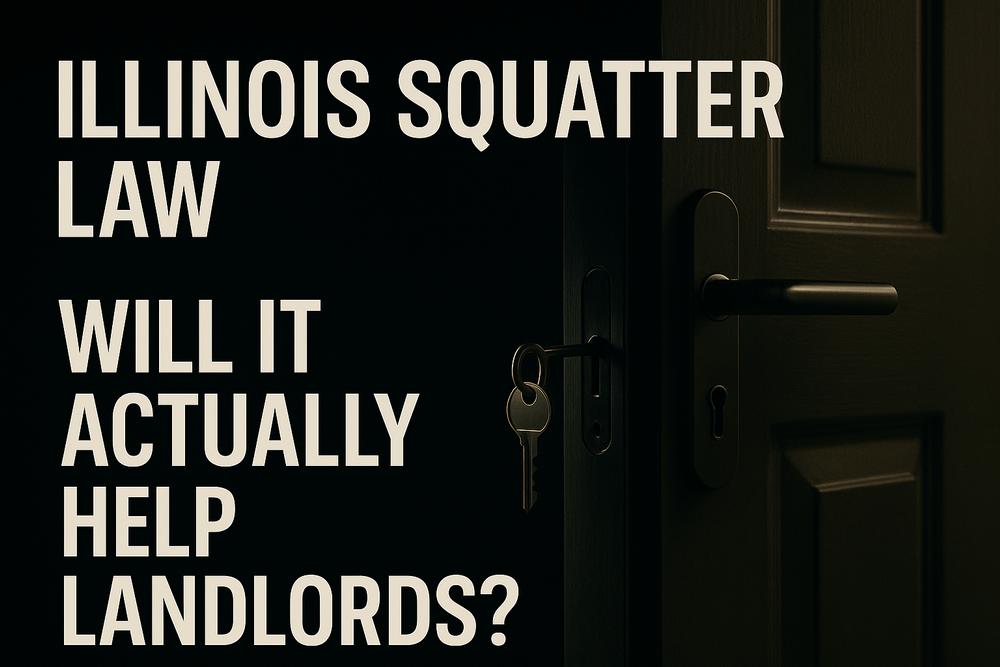
Author: Mark Ainely | Partner GC Realty & Development & Co-Host Straight Up Chicago Investor Podcast
When social media and news outlets shout headlines about lawmakers cracking down on “squatters,” it’s tempting to assume that relief is finally coming for owners who feel powerless against unauthorized occupants. In 2025 the Illinois Legislature passed a bill widely dubbed the “squatter law,” promising to make it easier for police to remove people who take up residence without permission. The notion conjures images of officers arriving with the authority to promptly clear out unlawful occupants and return keys to the rightful owners. Yet as with most things in real estate law, the reality is more nuanced. The law’s impact depends on the details, and understanding those details is essential if you own rental property in Chicago or anywhere in the state. In this post we’ll explain what the new legislation actually changes, why it may not function as a magic wand, and how you can still protect your property. Throughout, we’ll take you behind the headlines and highlight practical steps, because at GC Realty & Development, we believe good information prevents costly mistakes.
The Problem: People in Your Property Who Don’t Belong There
Few phone calls rattle a landlord more than one from a neighbor saying, “There are strangers living in your vacant unit.” It’s more than an annoyance; it’s a serious threat to your investment. Unauthorized occupants can cause damage, pose liability risks, and jeopardize relationships with neighbors. The eviction process is designed to provide due process to tenants, but what if the occupants are not tenants at all? That’s where the term squatter comes in, someone occupying property without permission or a legal claim.
In practice, squatters may break in while a home is on the market, change the locks, and then present a forged lease when police arrive. Other times they are friends or relatives of tenants who stay behind after the lease ends. Sometimes a fraudulent subletter collects rent from an unsuspecting occupant, leaving the true owner to sort out the mess. Because the law affords renters significant protections, unscrupulous actors can exploit the system, dragging out eviction proceedings and costing owners months of lost rent and legal fees. Stories abound of landlords who spent thousands to regain control, only to find the property trashed.
The public outcry reached a fever pitch after a Chicago lawmaker discovered that squatters were occupying a vacant house on his block. Photos of people lounging on a porch they did not own made the nightly news and prompted demands for change. In response, lawmakers drafted a bill aiming to “fix” the squatter problem. But what did the bill actually do?
The Legislative Fix: Clarifying Police Authority
The new law, formally known as Public Act 104‑0029, amends the Illinois eviction statute. Lawmakers added language stating that nothing in the Eviction Act prohibits law enforcement from enforcing criminal trespass laws or removing trespassers from property. In plain English, it clarifies that police can arrest someone for criminal trespass even when the property owner has not yet obtained an eviction order. For years, many police departments viewed eviction courts as the only venue for removing unwanted occupants, citing the civil nature of landlord–tenant disputes. Officers often refused to make arrests for trespass, telling landlords to file in court instead.
Supporters of the amendment celebrated it as common‑sense reform. They argued that the police needed clear authority to act swiftly when someone occupies a property without any legal right. Prior to the amendment, there was ambiguity about whether officers could intervene without a court order. Now the law states, in no uncertain terms, that the Eviction Act does not block criminal trespass enforcement. In theory, that means if you find someone squatting in your vacant home, you should be able to call the police and, if they confirm trespass, have them removed. The statute takes effect January 1 2026 and applies statewide.
Why the Law May Not Be the Cure Owners Hoped For
If this sounds like a simple fix, you’re not alone. But legal practitioners have pointed out several reasons the new law may not dramatically change day‑to‑day reality. First, the statute did not create an expedited procedure for proving ownership or establishing that an occupant is a trespasser rather than a holdover tenant or lawful subtenant. Police still must have probable cause to believe that a crime is occurring before they can arrest or remove someone. That means they need some basis to conclude that the person has no rights to the property, and that can be tricky.
Consider a scenario: you walk into a vacant unit you own and find two people inside. They show you a lease with your company’s name on it and say they paid the previous tenant who told them you wouldn’t mind. The lease looks fake, but how is an officer on the scene to know? Is it a civil dispute or criminal trespass? Without a formal hearing, police may be hesitant to remove them. The new law gives them permission to enforce trespass statutes but doesn’t dictate that they must. Officers still have discretion, and many departments, particularly in tenant‑friendly jurisdictions like Chicago, may default to the court process rather than risk wrongful arrest.
Another limitation is that the law does not distinguish between holdover tenants (people who were once lawfully renting but have overstayed after the lease expired) and squatters (people who never had permission to be there). A holdover tenant typically remains protected under eviction law, meaning the landlord must serve proper notices and obtain a court order. Without clear guidelines, some police officers may err on the side of caution and decline to intervene, even when you believe the occupant is a squatter.
Finally, the law does nothing to streamline the eviction process when there is a real dispute about possession. If the person presents any evidence of a lease or payment, the matter likely still belongs in eviction court. That process can take weeks or months depending on backlog, and the new law provides no mechanism to speed it up. In effect, the law clarifies that police can enforce trespass, but it does not force them to act, nor does it resolve the underlying due process requirements.
The Status Quo: What Owners Should Expect
Lawyers who represent property owners are counseling clients not to count on a wholesale change in how law enforcement responds to these calls. In most circumstances, you will still need to file an eviction action if someone who is not on your lease is living in your unit, especially if they claim any right to stay. That means preparing the correct notices, filing in the appropriate county, attending court hearings, and obtaining a judgment for possession before the sheriff will execute the eviction. Illinois law continues to prohibit “self‑help” evictions, so changing the locks or physically removing someone yourself can expose you to civil and even criminal liability.
With this in mind, here are practical steps to minimize your risk and respond effectively:
Maintain clear records. Keep copies of your deed, title insurance, mortgage statements, tax bills and any leases. When law enforcement arrives, you may need to prove ownership and identify who has a legitimate right to live there. Digital copies accessible on your phone or in a cloud folder can save precious time.
Use written notices appropriately. Illinois law allows property owners to serve a notice barring someone from the property. If a person re‑enters after being served, they commit criminal trespass, and police are more likely to arrest. Work with your attorney to draft and serve barred‑person notices properly. Make sure they include the date, the property address, your name as the owner, and clear language instructing the person to leave.
File evictions promptly when necessary. If you suspect a squatter but they produce any document purporting to give them rights, the safer course is to file a forcible entry and detainer (eviction) action. Courts can quickly determine who has the right of possession. While the process isn’t instantaneous, a timely filing prevents months of delay.
Avoid confrontation. Do not physically remove or threaten unauthorized occupants. Not only could you face assault charges, but it may also undermine your case. Let police and the courts do their jobs. If you feel threatened, call law enforcement immediately.
Communicate with neighbors. Ask trusted neighbors to inform you if they see unusual activity around vacant units. Early detection gives you more options and reduces potential damages.
What About Adverse Possession?
One question that often arises in these discussions is whether a squatter can eventually gain legal title to your property through adverse possession. Adverse possession allows someone who openly occupies land under claim of right for a statutory period (generally 20 years in Illinois) to acquire ownership. In practice, it is rare. To succeed, the occupant must show exclusive, continuous, and notorious possession under a claim that conflicts with the true owner’s rights. Squatters who hide out or use forged leases rarely meet these elements. Still, long‑term unauthorized occupancy can complicate title and resale. The best defense is vigilance and prompt action. Don’t let an unlawful occupant stay for months hoping they will go away; the longer they remain, the harder it becomes to remove them.
GC Realty’s Perspective: Solve Problems Before They Grow
As professional property managers, we see the full spectrum of occupancy issues. One consistent theme is that early intervention prevents small problems from becoming disasters. Here’s how we approach unauthorized occupants:
Rigorous tenant screening. Many squatting situations begin with an unvetted subtenant or an unqualified renter. Our tenant placement service involves thorough background and credit checks, income verification, and reference calls. When you place high‑quality tenants, the likelihood of them allowing unauthorized occupants drops dramatically.
Clear lease language. We draft leases that prohibit subletting without written consent and require tenants to register all occupants. The lease empowers us to act quickly when someone is living in a unit unlawfully.
Routine inspections. Regular property inspections help us detect unauthorized occupants early. Our property managers look for signs such as extra bedding, changed locks, or unusual wear and tear. If we suspect a problem, we investigate immediately.
Prompt legal action. In ambiguous cases, we lean on our legal partners to serve barred‑person notices and file evictions when appropriate. Our familiarity with local courts allows us to navigate the process efficiently.
Emergency response plans. We have protocols for neighbors and vendors to report suspicious activity. Our team knows how to document trespass and communicate with law enforcement.
When owners work with a professional management company like GC Realty & Development, they get a partner who can prevent unauthorized occupancy and handle it swiftly if it occurs. We offer a free rental analysis to help you assess whether your property is priced appropriately and attract the right tenant. We also provide tenant placement services for owners who manage their own units but want help finding and screening renters. Our goal is to reduce vacancy and stress while increasing return on your investment.
Questions & Answers
Q: What’s the difference between a squatter and a holdover tenant?
A squatter is someone occupying property without permission or a legal right, often by breaking in or being tricked into renting by a fraudster. A holdover tenant is someone who originally had a valid lease but remains after it expires. Holdover tenants still fall under the Eviction Act’s protections and must be removed through the court process, whereas true squatters can potentially be arrested for trespass once police confirm they have no lawful claim.
Q: How can I prove to the police that someone is trespassing?
Always carry or have quick access to documents showing you are the owner or authorized agent. These include your deed, a current utility bill in your name, and a lease with your tenant’s names. If the occupant cannot produce a legitimate lease or receipt from you or your agent, that may support a trespass complaint. Serving a written barred‑person notice further strengthens your case if the person returns.
Q: Do I still need to file an eviction if the person claims they paid rent?
Yes. If the occupant produces any evidence, even a questionable lease or payment receipts, most police departments will decline to remove them. The safest course is to file a forcible entry and detainer action and let a judge determine possession. The new law does not change this fundamental due process protection.
Q: Can I change the locks or shut off utilities to force a squatter out?
No. Illinois law prohibits self‑help evictions, even against unauthorized occupants. Changing locks or shutting off utilities may be considered illegal lockout or harassment, exposing you to fines and damages. Always follow legal procedures and involve law enforcement or the courts.
Q: How long does the eviction process take?
Timelines vary by county, docket volume and whether the case is uncontested. A straightforward non‑payment eviction can take six to eight weeks from filing to sheriff’s eviction. Complex cases involving disputed tenancy or post‑judgment motions can take longer. The new squatter law does not guarantee a faster process; the key is filing promptly and providing clear evidence.
Q: How can GC Realty help me prevent squatting?
We offer comprehensive property management, including robust tenant screening, regular inspections, and swift legal action when issues arise. Our free rental analysis ensures your unit is competitively priced to attract quality renters. For owners who only need help finding a tenant, our tenant placement service screens applicants thoroughly and helps you avoid common pitfalls that lead to squatting. Contact us to learn how we can reduce your risks and maximize your returns.
About GC Realty & Development
GC Realty & Development LLC is a full-service Chicago property management company that has been managing residential, multifamily, and commercial properties since 2003. With over 1,400 units and 1 million square feet of commercial and industrial space under management, GC Realty has built a reputation as Chicago’s Responsive Property Manager.
Our team is known for clear communication, transparency, and quick action. Whether you need help with tenant placement, full-service property management, or understanding Chicago landlord laws like the RLTO or RTLO, GC Realty provides the expertise, systems, and local insight to protect your investment and increase profitability.
Visit www.gcrealtyinc.com to learn more or request your Free Rent Analysis today.
Don’t Want To Go At This Alone?
We’ve shared a lot of information here on investing in real estate locally in Chicagoland. If you live outside the area, it may seem overwhelming for those wanting to invest in the Chicago market. But we really just look at it as a team sport.
Who’s on your investing team? Do you even have a team? GC Realty & Development, LLC has a dedicated team of professionals willing to share decades of experience in all facets of real estate investment. We handle everything from brokerage, leasing, and property management. Whether you hire us or not, we’re happy to provide our resources and expertise.
What gets me up in the morning and keeps me going 12 hours a day is the ability to add value to local area investors in Chicago and beyond! Those who connect with me often hear me say that our goal is to bring value to everyone we come in contact with.
We hope that in return, they will one day hire us for our tenant placement or property management services, refer us to someone they know, or leave a review about our services. We would clearly love all three; however, we’re happy whenever we get the opportunity to help!
Reach out today!

 Vendor Portal
Vendor Portal



